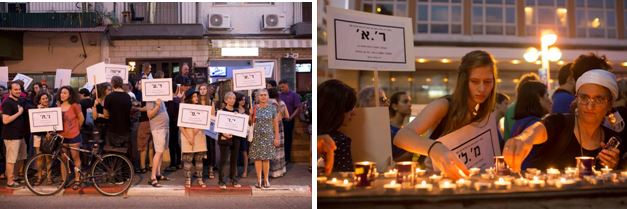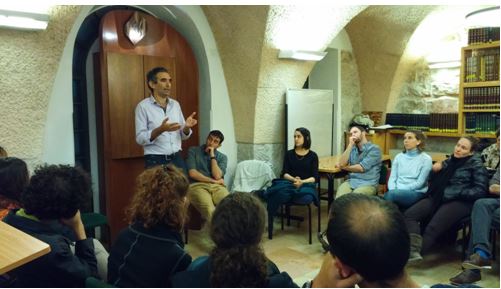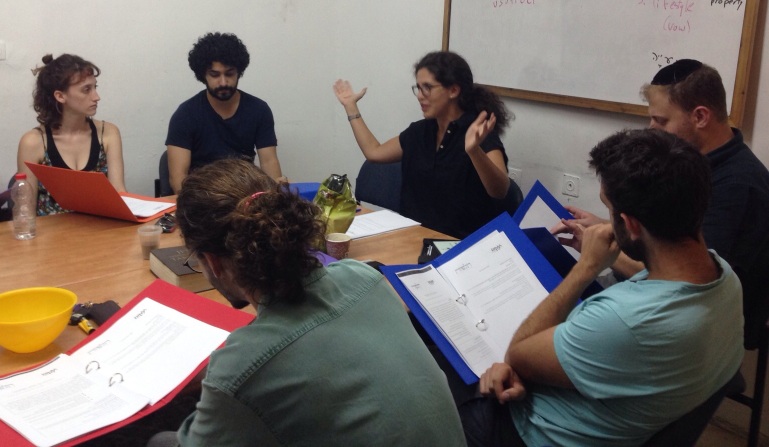ATZUM’s Task Force on Human Trafficking and Prostitution has launched its latest campaign entitled, “Meet the Meat”. This campaign seeks to increase a growing awareness of the evils of Israel’s sex trafficking and prostitution “industries”. We want each person in Israel to understand that prostitution is never a choice, not a legitimate “job”. Prostitution is violent exploitation of the body and soul and should be delegitimated in a just society.

At Israel’s Knesset June 28, 2017
This campaign was launced at a critical time regarding the broadening positive consensus in the Knesset urging adoption of Nordic Model legislation in Israel criminalizing the client and rehabilitating the prostituted person. These significant achievements would not have happened without the help of our supporters who have joined us in becoming agents of social and policy change. Together we can significantly decrease and then eliminate prostitution in Israel.
Who are the prostituted people?
Ninety-five percent of prostituted people in Israel are women, nearly all Israel citizens; 87% of them are Jewish. Prostituted women come from all social and ethnic backgrounds. Despite that diversity, there are many similarities of personal history and the causes that led them to prostitution. Most prostituted women grew up in an environment of home violence and suffered severe abuse within the family. Eighty percent of prostituted women were sexually abused during childhood; most report fleeing home before engaging in prostitution.
Nearly all women in prostitution come from low socioeconomic strata. According to the National Survey on Prostitution published last year by the Ministry of Social Affairs, 62% of prostituted women are mothers, and 82% of those women are single parents to children under 18 without family or other support. Ninety percent of women in prostitution are controlled by pimps.
Extreme physical and emotional violence and PTSD are ubiquitous and inherent to prostitution. Such violence includes constant humiliation, beatings and rape by both clients and the pimps. Seventy percent of prostituted women questioned in the National Survey testified that they had been raped. There is a disconnect between body and mind, often resulting in amnesia, depression, eating disorders and heightened mortality rates. Few women in prostitution in Israel live to age 50.
Many prostituted women use addictive drugs. Contrary to the prevailing view, for most the use of drugs began only after entering prostitution as a means to create a sense of separation between body and consciousness, a desparate attempt to mask the pain that accompanies prostitution. No surprise then that 80% percent of the women wish to leave prostitution if they had the support to do so.
The National Survey reveals there are 12,500 prostituted persons in Israel. Prostitution itself (not including “deriviative” pornography sites, strip clubs etc.) handles more than 1.2 billion NIS/30 million USD annually. A prostituted woman is demanded to service six clients daily, an estimated one million visits per year in brothels, ”discreet” aparmtents and hotel rooms.
Myths about prostitution:
“Prostitution always existed and will always exist.“ – Prostitution is not a profession, it is a violent social phenomenon which ruthlessly exploits women and children selling their bodies.
“If prostitution is prohibited, the incidence of rape will increase.” The motives of rapet are not of sexual release but the violent control of a woman’s body. In those countries which criminalize the purchase of prostituted services, there is no increase in the rate of rape.
“It’s easy, fast money.“ – The vast majority of women in prostitution are destitute. Profits from prostitution are overwhelmingly those of traffickers and pimps.
About the criminalization of johns
The most practical way to halt the abuses of prostitution is to reduce demand, which will reduce supply. Criminalization of the purchase of sexual services ihas proven by far the most effective way to eliminate prostitution.
The Task Force on Human Trafficking and Prostitution
is a joint initiative of ATZUM-Justice Works and Kabiri Nevo Keidar & Co.
project119.tfht@gmail.com










